

|
 Soups A dark meat-based brown soup, of various reputed compositions. Often served with Sherry or Madeira added. 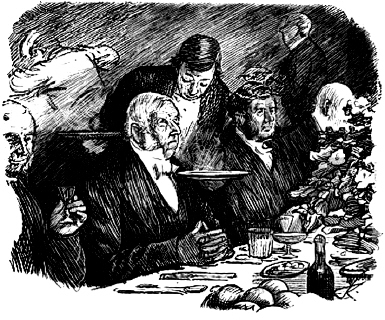 Pick up pretty much any recent book on English food and you'll be told that Brown Windsor was The Victorian favourite, possibly the dominant English soup until WW2. You'll be told that it was always served at Windsor Castle, that it was the Queen-Empress's preferred starter, that it was a staple of boarding-houses and always turned up in railway dining cars. It is described as "the very soup reputed to have built the British Empire." and we're told that it "regularly appeared on state banquet menus". You'll learn, too, that it was thick and stodgy and that everybody hated it. All of which is very odd as we can't find any reference to it anywhere, scour though we have the cookery books, newspapers and literature of Victorian and Edwardian times. It isn't on menus, even railway ones, nor in magazines. It isn't in any novels, it isn't in encyclopedias and the National Archive have nothing on it. It isn't mentioned in any cookbooks, it isn't in Mrs Beeton, or Eliza Acton, and 'Punch ' doesn't even make fun of it. In fact this 'Victorian and Edwardian staple' doesn't turn up anywhere before the 1920's, and then only very, very, rarely. Hartlepool Northern Daily Mail - Friday 21 May 1926 With thanks to David Morton Brown Windsor Soap, however, is well attested since the 1830's. Could it possibly be that the name was applied to commonplace hotel brown gravy soups as a joke, perhaps parodying the well-known rice-based White Windsor Soup? 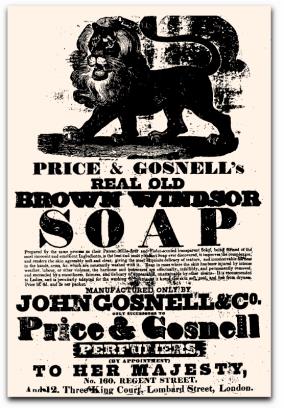 Brown Windsor Soap is well-attested Certainly, BWS is repeatedly presented as The joke soup, even appearing on the menu at Fawlty Towers. The 1994 TV version of 'Hercule Poirot's Christmas' has the Belgian detective lamenting to a hotel waiter that his soup "does not look very delicieux", to be told "Well, sir, it IS brown Windsor", though the episode isn't in Agatha Christie's original 1930's book. The British Food Trust seem to think it is "one of those soups that for years has had a terrible reputation" (the others being..?). The 'Independent' on Food says it is "Occasionally heard of, but never seen" it. Marguerite Patten in her 'Century of British Cooking' is pretty sure it was "a very indifferent dish", but admits she can find no record of it. Even the charmingly eccentric windsorsoup.co.uk, can't find anything about it from before 1993. The britishfoodhistory blog goes all the way and declares that the Royal House of Windsor took their name from the soup, which, they tell us was "served up by every housewife at the time." Some people, including Norman Tebbit, Clarissa Dickson Wright, Peter Hitchen and a remarkable number of contributors to 'The Daily Mail' even seem to remember it being served, though they can never quite remember where. Or when. In fact, if Google Books is to be trusted, and it probably is, then there are about 1,400 references to BWS in books and magazines, and not one single one of them before 1961. 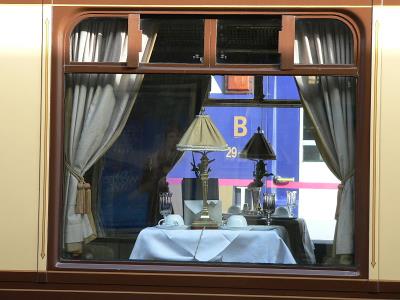 Then there's the Railways. 'A Taste of Empire' by Cecilia Leong-Salobir (2011) says Brown Windsor was "a soup omnipresent on the train menus of British Railways" and an extraordinary number of people seem to definitely remember it being served on trains, which is very odd, as soup is pretty much never served on trains, for fairly obvious reasons. An extensive investigation by the National Railway Museum for Foods of England in 2013 found not one single reference to BWS in hundreds of archived menus and dining-car leaflets from the 19th Century up to the days of British Rail, nor anything at all in their library on railway catering. The nearest thing was a 'Potage Windsor' served at the Southern Railway hotel in Sidmouth to celebrate the marriage of Princess Elizabeth to the Duke of Edinburgh in 1947, no mention of soup colour. It may not be in real old cookbooks, but it is prominent in such recent founts of wisdom as 'The Unofficial Harry Potter Cookbook' and the equally Unofficial 'Downton Abbey Cookbook' as well as John Pearson's' Authorised Biography of James Bond' and Helen Rappaport's 2003 (presumably unauthorised) Biography of Queen Victoria. There are two or three references to 'Windsor Soup' or 'Potage Windsor' or even 'Potage Windsor - Brown' in adverts from the 1920's, but what we're concerned with here is Brown Windsor Soup, by that name. It seems that BWS has acquired mythic status as a testament to horrid English cooking, damp hotels and the sort of Imperial foisting-on which we're glad to have put behind us. All of which is very odd, as it isn't easy to understand how a simple soup could be in any way horrid, or even if it was, why people supposedly kept on serving it. It rather looks as if BWS did indeed begin life as a joke, and a very recent one, too. It is mentioned in passing in a couple of 1940's novels, as a metaphor for horrible soup, and, with thanks to the sleuthing of John Leiska and Rory O'Donnell, first seems to appear in any sound recorded form where Alec Guinness, in his best Alec Guinness sneery-voice, says "I can thoroughly recommend the Brown Windsor Soup" in the 1953 Ealing Comedy 'The Captain's Paradise', and "a plate of brown Windsor down the back of his neck and he'll soon shift" in a restaurant sketch which included such memorable dishes as what sounds like "a bunghole of biscuit tripe" in the BBC radio comedy 'Hancocks Half Hour on 15th Feb 1955. But it was the recurring theme of Brown Windsor Soup in Spike Milligan's scripts for the BBC Radio comedy The Goon Show which really seems to have made it famous as the Horrid Soup. It started on 25th October 1956: SEAGOON: Very well then. If the Scots want to make it a war on nutrition, we have an English dish in our armoury twice as deficient in calories as porridge and twice as deadly And they didn't stop there. The Goons carried on and on with BWS jokes for years, always as a synonym for silly Englishness. They had; "I successfully changed all the Chinese back into Englishmen by giving them injections of Brown Windsor Soup." as well as "Hoist a small Union Jack and unveil a bust of Queen Victoria. Now I'll just make a rough 'Englishman lost on the mountainside Menu'. Brown Windsor soup, meat, two veg, cabinet pudding." 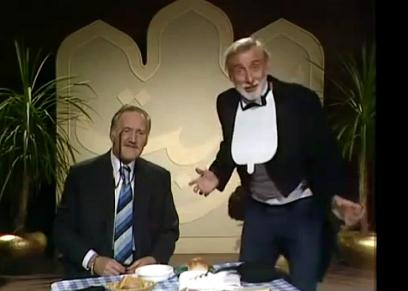 Spike Milligan (right) of the 'Goon Show'' in another soup-related sketch Foods of England therefore officially concludes, (see: BWS Information) that, far from being a Victorian staple, Brown Windsor Soup, as we know it now, was invented in the early 20th century for comedic, not culinary, purposes, and all other histories of it are complete fantasy. Now, generally speaking, we're terribly fussy at Foods of England about always having the genuine original receipt for everything. But in this case, here's the nearest you're going to get...  The official Foods of England Receipt The official Foods of England ReceiptBrown Windsor Soup 'Victoria' This works extremely well. The beef is assumed to be quintessentially English, while the pepper, fruit and vinegar give it an Olde flavour. The Madeira makes it seem Victorian and the method of service adds an elegant (but cheap) surprise. Serves 4 1 pint brown beef gravy 1 teaspoon malt vinegar 2 peppercorns, crushed 1 oz dark dried fruit (figs, dates, tamarind) Small glass of Madeira, warm Splinge everything, bar the drink, up in one of those machines until smooth. Re-heat and serve with an inadeqate sprinkle of parsley and, separately, a small glass of hot Madeira to be added to the soup by the diner. If the gravy is good, it will be "very delicieux" anyway, but doing it this way allows the joke to be continued, in that the diner can pretend that they must needs add alcohol to make it palatable. 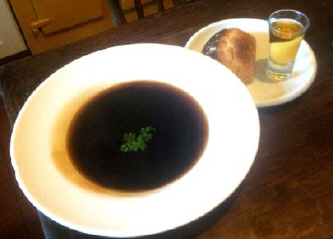 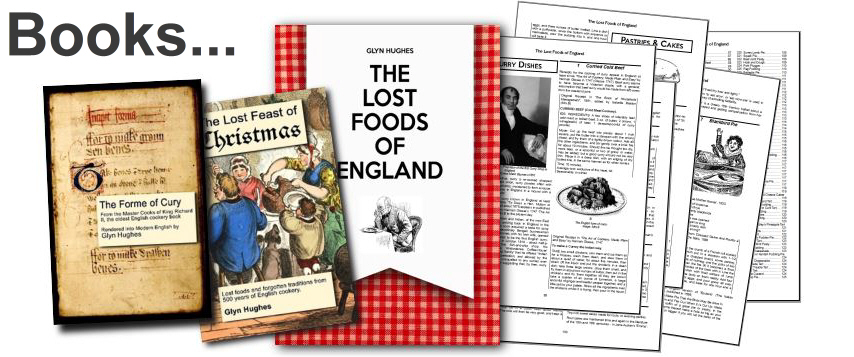 |
|
MORE FROM Foods of England... Cookbooks ● Diary ● Index ● Magic Menu ● Random ● Really English? ● Timeline ● Donate ● English Service ● Food Map of England ● Lost Foods ● Accompaniments ● Biscuits ● Breads ● Cakes and Scones ● Cheeses ● Classic Meals ● Curry Dishes ● Dairy ● Drinks ● Egg Dishes ● Fish ● Fruit ● Fruits & Vegetables ● Game & Offal ● Meat & Meat Dishes ● Pastries and Pies ● Pot Meals ● Poultry ● Preserves & Jams ● Puddings & Sweets ● Sauces and Spicery ● Sausages ● Scones ● Soups ● Sweets and Toffee ● About ... ● Bookshop ● Email: editor@foodsofengland.co.uk COPYRIGHT and ALL RIGHTS RESERVED: © Glyn Hughes 2022 BUILT WITH WHIMBERRY |